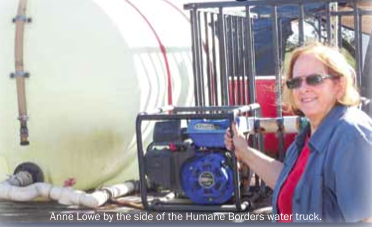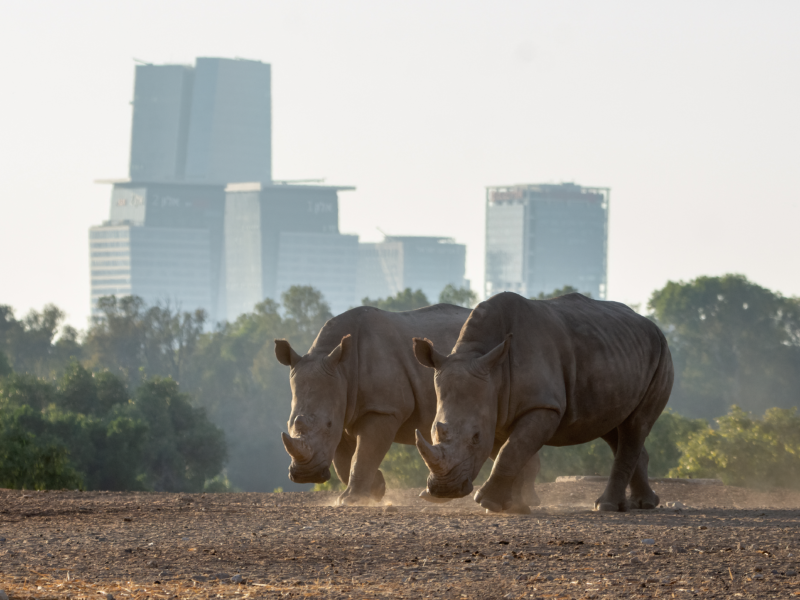“Do you know what this is?”
Just before I climbed back up into the Humane Borders water truck, Rex called me over to where he was dislodging a grungy item from the sand. I looked it over: an old piece of white towel, about a foot square, with orange stripes, raggedy and encrusted with desert soil. “A piece of towel?” I ventured. “Right. But what do you think it is used for?” was his next question. I truly had no idea. I stared at him blankly, sure I had failed on my initial water run trip to the Ironwood Forest National Monument, at our first stop to refill three agua (water) tanks.
“It’s used by migrants. They tie these under their soles, to cover any distinctive tread from their walking shoes, so the Border Patrol can’t track them,” Rex explained. Since we were about 70 miles north of the border between Mexico and Arizona, it was evident that migrants had walked a great distance before leaving this piece of toweling. They had bypassed Tucson, and were on their way to Phoenix.
Every water run that I went on this year yielded new educational opportunities for me. On the way to Byrd Camp one Saturday this past May, Michael, another driver who had volunteered for Humane Borders for 11 years, abruptly stopped the truck on a dirt road in the Sonoran desert, near Arivaca. He jumped out and came back with an empty black plastic water jug, similar to a plastic milk container, tucked under one finger.
“Why do you think this is black?” he asked me. I couldn’t figure it out. It would seem that black would make the water inside even hotter, rather than cooler. I stammered something to that effect. He told me, “It’s black because if it was white or clear plastic, it would reflect the headlights of the Border Patrol trucks at night. Black is safer.” I later learned that the black plastic water containers were manufactured in Mexico and sold to migrants planning to cross into the United States.
Byrd Camp is my favorite run. Since I work full time, I chose a weekend water delivery for my first trip as a volunteer for Humane Borders. It turned out to be to Byrd Camp.
More than 200 migrants have perished in the Arizona desert since January of this year. Besides Humane Borders, which provides water deliveries, other organizations also try to prevent death by dehydration in the desert. Often the “Coyote leaders” leave people behind because their feet are totally covered with blisters, or they have no more water and cannot continue due to dehydration. The Samaritans drive into the desert hoping to find these people before the angel of death does. They transport them to a medical unit in the middle of the desert on Byrd Baylor’s private property. Byrd is a well-known children’s author who has donated land for this life-saving work. It is run by a third organization called No More Deaths (No Mas Muertes), and it looks like a MASH unit, with a big military style tent with red crosses on it. Here the ailing migrants are treated to free medical care by volunteer doctors and nurses, each of whom stay a few days, or
a week or two at Byrd Camp. Conditions are incredibly primitive, but enough to save lives.
Our job was to pump 300 gallons of water from our truck into the plastic 55 gallon containers at Byrd Camp, because there is no water there, other than what we bring each week. It is used for drinking, washing, cooking, medical care, etc. I get a kick out of seeing the volunteers go to the washing station with piles of dirty dishes to clean, as soon as our truck appears. Dirty dishes are the last thing on the list, until there is abundant water.
Many of the migrants are not Mexicans; they are from Guatemala, El Salvador and the Honduras. They hop trains to take them to the border at Nogales. Then they walk for one to five days to meet with the Coyotes to take them across the border. Sadly, they are younger than one might think. Recently, a 12-year-old girl was found in the desert with her 3-year-old sister, wandering alone, left behind by the Coyote. Another young woman told of waiting in Nogales, Sonora, for another $1,000 from her family in Guatemala. She already had $6,000 to pay the Coyote, but she needed to give him another $1,000 for rape insurance!
What I heard and saw on these trips is indelibly etched into my persona. It is a small way to help my fellow human beings, to make a tiny difference “in loving the stranger as myself,” as I am taught in the Torah.
These migrants, who are trying to cross the desert, break the law for what they feel are legitimate reasons: to escape violence, to better themselves, to join relatives here, or to provide for their families. During their desert crossing, they do not get manna from heaven every day, nor do they have Moses to strike a rock to bring them water. Instead they have Humane Borders, The Samaritans and No Mas Muertas.
Now I am learning to be one of the water truck drivers for Humane Borders. I can even get the gasoline motor for the water pump started with just one pull of the cord. Not bad for a grandma of eight. Anne Lowe is the outreach director of the Jewish Federation of Southern Arizona and the Jewish Federation Northwest Division director in Oro Valley.
Saving Lives is the Humane Thing to Do
Humane Borders is a Tucson nonprofit, faith-based organization, whose volunteers maintain close to 50 life-saving water stations in remote desert areas where migrants risk dying from dehydration. Their mission is to create a just and humane environment, where members respond with humanitarian assistance to those who are risking their lives crossing the U.S. border with Mexico. Humane Borders has an ongoing partnership with the Pima County office of the Medical examiner.
in addition to Anne Lowe, other Jews who are involved with Humane Borders include:
Bob Feinman, current vice president of Humane Borders. Bob has volunteered for 10 years, bringing water to the desert. He is fluent in Spanish, so he has also traveled to Mexico to speak to potential migrants to try to deter them from this dangerous journey.
“As Jews who followed Moses around in the desert we should be leading the charge on this,” says Bob.
Rabbi Ben Herman, was a board member of Humane Borders until this past June, while he was the assistant Rabbi at Congregation Anshei Israel in Tucson.
Amy Rangel, member of Congregation Bet Shalom, in Tucson, went on her first volunteer water run with Humane Borders, on Sept. 13 to Byrd Camp. She is definitely hooked!
Jill Rich, well known in Tucson for her volunteer work with migrants from many countries, headed the hospitality effort for Temple Emanu-el this past fourth of July weekend, to provide beds, food and assistance to mothers and children who were dropped off at the greyhound Bus station in Tucson by the immigration authorities. These immigrants from Guatemala included 16 mothers and children, age 9 months to 6 years. some had not eaten in two days. They were fed beans and rice, chicken and fresh fruit, and treated as guests.
Bryan Davis, director of the Jewish Community Relations Council, spent this past summer working with the Catholic Community services, to provide help to migrants who are left at the Greyhound Bus station by immigration authorities. humaneborders.org | 520-398-5053






